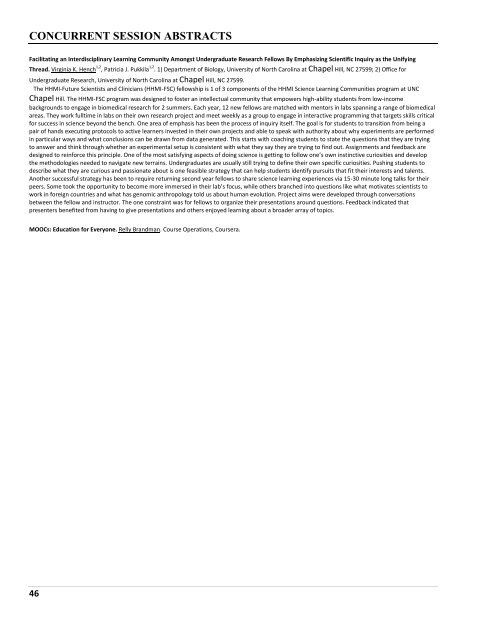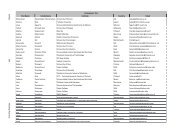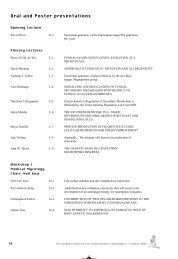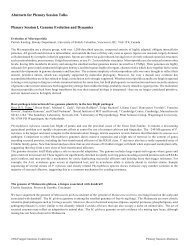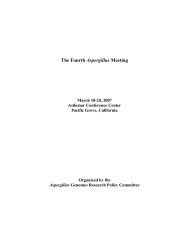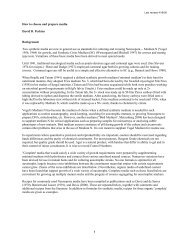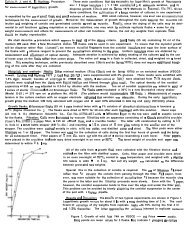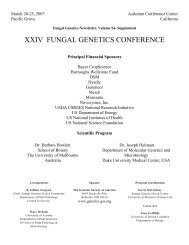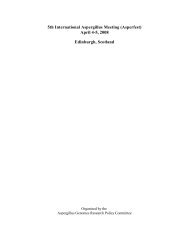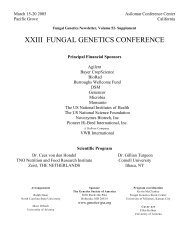- Page 1: Asilomar Conference GroundsMarch 12
- Page 7 and 8: SCHEDULE OF EVENTSFriday, March 157
- Page 10 and 11: EXHIBITSThe following companies hav
- Page 12 and 13: CONCURRENT SESSIONS SCHEDULESWednes
- Page 14: CONCURRENT SESSIONS SCHEDULESWednes
- Page 17 and 18: CONCURRENT SESSIONS SCHEDULESThursd
- Page 19: CONCURRENT SESSIONS SCHEDULESFriday
- Page 22 and 23: CONCURRENT SESSIONS SCHEDULESSaturd
- Page 24: CONCURRENT SESSIONS SCHEDULESSaturd
- Page 27 and 28: PLENARY SESSION ABSTRACTSThursday,
- Page 29 and 30: PLENARY SESSION ABSTRACTSFriday, Ma
- Page 31 and 32: PLENARY SESSION ABSTRACTSSaturday,
- Page 33 and 34: CONCURRENT SESSION ABSTRACTSWednesd
- Page 35 and 36: CONCURRENT SESSION ABSTRACTSUnravel
- Page 37 and 38: CONCURRENT SESSION ABSTRACTSSynergi
- Page 39 and 40: CONCURRENT SESSION ABSTRACTSWednesd
- Page 41 and 42: CONCURRENT SESSION ABSTRACTSWednesd
- Page 43 and 44: CONCURRENT SESSION ABSTRACTSWednesd
- Page 45 and 46: CONCURRENT SESSION ABSTRACTSA draft
- Page 47 and 48: CONCURRENT SESSION ABSTRACTSRegulat
- Page 49: CONCURRENT SESSION ABSTRACTSWednesd
- Page 53 and 54: CONCURRENT SESSION ABSTRACTSThursda
- Page 55 and 56: CONCURRENT SESSION ABSTRACTSThursda
- Page 57 and 58: CONCURRENT SESSION ABSTRACTSThursda
- Page 59 and 60: CONCURRENT SESSION ABSTRACTSThursda
- Page 61 and 62: CONCURRENT SESSION ABSTRACTSThe mut
- Page 63 and 64: CONCURRENT SESSION ABSTRACTSInnate
- Page 65 and 66: CONCURRENT SESSION ABSTRACTSThursda
- Page 67 and 68: CONCURRENT SESSION ABSTRACTSGenome-
- Page 69 and 70: CONCURRENT SESSION ABSTRACTSIdentif
- Page 71 and 72: CONCURRENT SESSION ABSTRACTSFriday,
- Page 73 and 74: CONCURRENT SESSION ABSTRACTSFriday,
- Page 75 and 76: CONCURRENT SESSION ABSTRACTSThe Scl
- Page 77 and 78: CONCURRENT SESSION ABSTRACTSThe rol
- Page 79 and 80: CONCURRENT SESSION ABSTRACTSFriday,
- Page 81 and 82: CONCURRENT SESSION ABSTRACTSCompari
- Page 83 and 84: CONCURRENT SESSION ABSTRACTSNovel t
- Page 85 and 86: CONCURRENT SESSION ABSTRACTSFriday,
- Page 87 and 88: CONCURRENT SESSION ABSTRACTSEffect
- Page 89 and 90: CONCURRENT SESSION ABSTRACTSCommon
- Page 91 and 92: CONCURRENT SESSION ABSTRACTSSaturda
- Page 93 and 94: CONCURRENT SESSION ABSTRACTSSeconda
- Page 95 and 96: CONCURRENT SESSION ABSTRACTSSheddin
- Page 97 and 98: CONCURRENT SESSION ABSTRACTSSaturda
- Page 99 and 100: CONCURRENT SESSION ABSTRACTSSaturda
- Page 101 and 102:
CONCURRENT SESSION ABSTRACTSSaturda
- Page 103 and 104:
CONCURRENT SESSION ABSTRACTSprocess
- Page 105 and 106:
CONCURRENT SESSION ABSTRACTSSpecifi
- Page 107 and 108:
LISTING OF ALL POSTER ABSTRACTSBioc
- Page 109 and 110:
LISTING OF ALL POSTER ABSTRACTS81.
- Page 111 and 112:
LISTING OF ALL POSTER ABSTRACTS160.
- Page 113 and 114:
LISTING OF ALL POSTER ABSTRACTS239.
- Page 115 and 116:
LISTING OF ALL POSTER ABSTRACTS322.
- Page 117 and 118:
LISTING OF ALL POSTER ABSTRACTS401.
- Page 119 and 120:
LISTING OF ALL POSTER ABSTRACTSmedi
- Page 121 and 122:
LISTING OF ALL POSTER ABSTRACTS558.
- Page 123 and 124:
LISTING OF ALL POSTER ABSTRACTS640.
- Page 125 and 126:
LISTING OF ALL POSTER ABSTRACTS723.
- Page 127 and 128:
FULL POSTER SESSION ABSTRACTS5. Cha
- Page 129 and 130:
FULL POSTER SESSION ABSTRACTS13. In
- Page 131 and 132:
FULL POSTER SESSION ABSTRACTSbioche
- Page 133 and 134:
FULL POSTER SESSION ABSTRACTS30. Me
- Page 135 and 136:
FULL POSTER SESSION ABSTRACTS38. Me
- Page 137 and 138:
FULL POSTER SESSION ABSTRACTSidenti
- Page 139 and 140:
FULL POSTER SESSION ABSTRACTSsecret
- Page 141 and 142:
FULL POSTER SESSION ABSTRACTSinvolv
- Page 143 and 144:
FULL POSTER SESSION ABSTRACTSdiploi
- Page 145 and 146:
FULL POSTER SESSION ABSTRACTSSaccha
- Page 147 and 148:
FULL POSTER SESSION ABSTRACTSresist
- Page 149 and 150:
FULL POSTER SESSION ABSTRACTS96. Ce
- Page 151 and 152:
FULL POSTER SESSION ABSTRACTS104. M
- Page 153 and 154:
FULL POSTER SESSION ABSTRACTScan ex
- Page 155 and 156:
FULL POSTER SESSION ABSTRACTSturgor
- Page 157 and 158:
FULL POSTER SESSION ABSTRACTSlike p
- Page 159 and 160:
FULL POSTER SESSION ABSTRACTSIndoor
- Page 161 and 162:
FULL POSTER SESSION ABSTRACTSlength
- Page 163 and 164:
FULL POSTER SESSION ABSTRACTSA scre
- Page 165 and 166:
FULL POSTER SESSION ABSTRACTSthen q
- Page 167 and 168:
FULL POSTER SESSION ABSTRACTS170. S
- Page 169 and 170:
FULL POSTER SESSION ABSTRACTSof sup
- Page 171 and 172:
FULL POSTER SESSION ABSTRACTSis fzo
- Page 173 and 174:
FULL POSTER SESSION ABSTRACTSgrowth
- Page 175 and 176:
FULL POSTER SESSION ABSTRACTSSeq da
- Page 177 and 178:
FULL POSTER SESSION ABSTRACTS212. T
- Page 179 and 180:
FULL POSTER SESSION ABSTRACTSCompar
- Page 181 and 182:
FULL POSTER SESSION ABSTRACTSmore g
- Page 183 and 184:
FULL POSTER SESSION ABSTRACTSmolecu
- Page 185 and 186:
FULL POSTER SESSION ABSTRACTSunexpe
- Page 187 and 188:
FULL POSTER SESSION ABSTRACTSrapid
- Page 189 and 190:
FULL POSTER SESSION ABSTRACTS260. T
- Page 191 and 192:
FULL POSTER SESSION ABSTRACTSFusari
- Page 193 and 194:
FULL POSTER SESSION ABSTRACTSScienc
- Page 195 and 196:
FULL POSTER SESSION ABSTRACTS286. G
- Page 197 and 198:
FULL POSTER SESSION ABSTRACTSincomp
- Page 199 and 200:
FULL POSTER SESSION ABSTRACTSfound
- Page 201 and 202:
FULL POSTER SESSION ABSTRACTS312. I
- Page 203 and 204:
FULL POSTER SESSION ABSTRACTSall th
- Page 205 and 206:
FULL POSTER SESSION ABSTRACTSPia La
- Page 207 and 208:
FULL POSTER SESSION ABSTRACTS335. A
- Page 209 and 210:
FULL POSTER SESSION ABSTRACTS342. F
- Page 211 and 212:
FULL POSTER SESSION ABSTRACTSThis i
- Page 213 and 214:
FULL POSTER SESSION ABSTRACTSJacobs
- Page 215 and 216:
FULL POSTER SESSION ABSTRACTScalciu
- Page 217 and 218:
FULL POSTER SESSION ABSTRACTSThe ab
- Page 219 and 220:
FULL POSTER SESSION ABSTRACTSexpres
- Page 221 and 222:
FULL POSTER SESSION ABSTRACTS394. F
- Page 223 and 224:
FULL POSTER SESSION ABSTRACTS398. U
- Page 225 and 226:
FULL POSTER SESSION ABSTRACTSthe id
- Page 227 and 228:
FULL POSTER SESSION ABSTRACTS415. A
- Page 229 and 230:
FULL POSTER SESSION ABSTRACTSAcuM b
- Page 231 and 232:
FULL POSTER SESSION ABSTRACTSdiverg
- Page 233 and 234:
FULL POSTER SESSION ABSTRACTSBck1 f
- Page 235 and 236:
FULL POSTER SESSION ABSTRACTSin the
- Page 237 and 238:
FULL POSTER SESSION ABSTRACTS455. T
- Page 239 and 240:
FULL POSTER SESSION ABSTRACTSor hos
- Page 241 and 242:
FULL POSTER SESSION ABSTRACTSfragme
- Page 243 and 244:
FULL POSTER SESSION ABSTRACTSenhanc
- Page 245 and 246:
FULL POSTER SESSION ABSTRACTSassess
- Page 247 and 248:
FULL POSTER SESSION ABSTRACTSmating
- Page 249 and 250:
FULL POSTER SESSION ABSTRACTScommon
- Page 251 and 252:
FULL POSTER SESSION ABSTRACTSOne of
- Page 253 and 254:
FULL POSTER SESSION ABSTRACTScells
- Page 255 and 256:
FULL POSTER SESSION ABSTRACTSof Ave
- Page 257 and 258:
FULL POSTER SESSION ABSTRACTSascaro
- Page 259 and 260:
FULL POSTER SESSION ABSTRACTSis a n
- Page 261 and 262:
FULL POSTER SESSION ABSTRACTSand th
- Page 263 and 264:
FULL POSTER SESSION ABSTRACTSCiuffe
- Page 265 and 266:
FULL POSTER SESSION ABSTRACTSon oth
- Page 267 and 268:
FULL POSTER SESSION ABSTRACTScopies
- Page 269 and 270:
FULL POSTER SESSION ABSTRACTSChem.
- Page 271 and 272:
FULL POSTER SESSION ABSTRACTS593. C
- Page 273 and 274:
FULL POSTER SESSION ABSTRACTS601. P
- Page 275 and 276:
FULL POSTER SESSION ABSTRACTSE.elym
- Page 277 and 278:
FULL POSTER SESSION ABSTRACTSThe de
- Page 279 and 280:
FULL POSTER SESSION ABSTRACTSMicrob
- Page 281 and 282:
FULL POSTER SESSION ABSTRACTSchromo
- Page 283 and 284:
FULL POSTER SESSION ABSTRACTSmating
- Page 285 and 286:
FULL POSTER SESSION ABSTRACTSAt the
- Page 287 and 288:
FULL POSTER SESSION ABSTRACTSemerge
- Page 289 and 290:
FULL POSTER SESSION ABSTRACTS666. G
- Page 291 and 292:
FULL POSTER SESSION ABSTRACTSof che
- Page 293 and 294:
FULL POSTER SESSION ABSTRACTSthe lo
- Page 295 and 296:
FULL POSTER SESSION ABSTRACTSin the
- Page 297 and 298:
FULL POSTER SESSION ABSTRACTSpotent
- Page 299 and 300:
FULL POSTER SESSION ABSTRACTSpoint
- Page 301 and 302:
FULL POSTER SESSION ABSTRACTS716. p
- Page 303 and 304:
FULL POSTER SESSION ABSTRACTSnatura
- Page 305 and 306:
FULL POSTER SESSION ABSTRACTSelemen
- Page 307 and 308:
KEYWORD LISTABC proteins ..........
- Page 309 and 310:
KEYWORD LISThigh temperature growth
- Page 311 and 312:
AUTHOR LISTBolton, Melvin D. ......
- Page 313 and 314:
AUTHOR LISTFrancis, Martin ........
- Page 315 and 316:
AUTHOR LISTKawamoto, Susumu... 427,
- Page 317 and 318:
AUTHOR LISTNNadimi, Maryam ........
- Page 319 and 320:
AUTHOR LISTSenftleben, Dominik ....
- Page 321 and 322:
AUTHOR LISTYablonowski, Jacob .....
- Page 323 and 324:
LIST OF PARTICIPANTSLeslie G Beresf
- Page 325 and 326:
LIST OF PARTICIPANTSTim A DahlmannR
- Page 327 and 328:
LIST OF PARTICIPANTSIgor V Grigorie
- Page 329 and 330:
LIST OF PARTICIPANTSMasayuki KameiT
- Page 331 and 332:
LIST OF PARTICIPANTSGeorgiana MayUn
- Page 333 and 334:
LIST OF PARTICIPANTSNadia PontsINRA
- Page 335 and 336:
LIST OF PARTICIPANTSFrancis SmetUni
- Page 337 and 338:
LIST OF PARTICIPANTSAric E WiestUni


